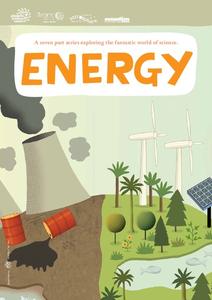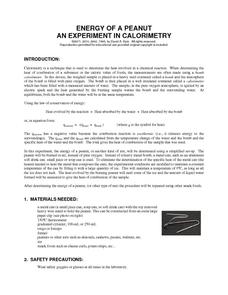Texas State Energy Conservation Office
Investigation: Kinetic and Potential Energy
A well-developed lab sheet guides physical science learners through an investigation of kinetic and potential energy. In small groups, collaborators discover whether or not the ramp height or mass of an object has an effect on the...
Texas State Energy Conservation Office
Investigation: Conservation of Energy
By rolling marbles down a six-foot length of track, physical scientists determine how much energy is lost to heat. It is recommended that you opt for the foam pipe insulation track because more friction slows the marble, allowing...
Curated OER
Energy Transformation Worksheet
Upper elementary or middle school scientists determine what types of energy are involved in six different pictures. Then they produce examples of three different energy transformations. This learning exercise has colorful graphics and is...
Texas State Energy Conservation Office
Investigation: Chemical Models
Science teams make models of four different hydrocarbon compounds that we commonly use for fuel. Then they demonstrate chemical reactions that result when energy is produced. This can be used as an enrichment when your class is studying...
Curated OER
Energy
In this science worksheet, students learn about renewable, non-renewable and sustainable energy and examine alternative fuel sources by studying the information on these 8 pages. Students complete 20 questions about energy. These pages...
Chymist
Energy of a Peanut
Are you nuts? An engaging experiment burns nuts to find their kilocalories. Young chemists analyze at least two different types of nuts with their experimental results versus what is on the package. The resource offers a great lab for...
Curated OER
Energy Crossword
In this science worksheet, students solve the crossword puzzle using the context of energy to acquire a new understanding of vocabulary words.
Curated OER
Energy Transformation
In this energy transformation worksheet, students earn extra credit by choosing a energy transforming toy or ride at an amusement park and analyzing the energy transformation involved in its movement. Students draw a diagram to...
Curated OER
Solar Storm Energy and Pie Graphs
In this solar storm energy and pie graphs learning exercise, students solve 5 problems using pie graphs that show the amount of solar energy that is converted into radiation, kinetic energy, flare energy and flare energy that is lost to...
Curated OER
Understanding the Conservation of Energy
In this conservation of energy worksheet, students read about the law of conservation of energy and about energy distribution. They answer three critical thinking questions about what the law of conservation of energy means to us for...
Curated OER
Energy Resources
In this energy worksheet, students will review the different types of energy and how energy can be created and conserved. This worksheet has 10 matching and 11 short answer questions.
Curated OER
Energy and Mass-Same Things But Different!
In this energy and mass worksheet, learners read about Einstein's formula, E=mc2 and they solve six problems. They convert from different energy units to different mass units using a given formula.
Curated OER
Explore Efficient Energy Uses
In this energy worksheet, students explore different ways to conserve energy. They write a short description for each of the 10 methods presented.
Rhythm Rhyme Results
Whatʼs the Same and Whatʼs Different?
Learn about radiation, convection, and conduction with a multiple choice worksheet. Each question prompts kids to decide what is different about each form of heat energy transfer, and what is the same.
Savvas Learning
Let's Get Moving
Scholars examine, cut, paste, and sort 12 images featuring different types of movement in order to show what they know about energy—potential and kinetic.
It's About Time
Energy from Coal
If plastic is derived from fossil fuels and fossil fuels come from dead dinosaurs, does that mean that plastic dinosaurs are made from real dinosaurs? This lesson goes into depth about coal and other fossil fuels. First the instructor...
Curated OER
Module 7 Revision Guide - Chemistry
Two versions of this handout are provided, the second with more detailed information on the same topics. Chemistry aces survey chemical reactions, heat energy transferred, and the action of enzymes by reading this resource. You can...
Curated OER
Unit 2 ~ Atomic Structure
As an atomic structure reference and review tool, this handout fits the bill. The first page provides definitions and tables of orbitals, electrons, and energy levels. The second page is an opportunity to practice determining numbers of...
Curated OER
Magnetic Induction
In this electricity worksheet, learners learn about magnetic induction plus compare a generator with a motor. Students also review the different kinds of energy and the formulas associated with energy. This worksheet has 28 matching, 10...
Texas State Energy Conservation Office
Investigation: Making a PV Cell
Rise and shine! Class members collaborate to construct a photovoltaic solar cell with two semiconductor layers, as guided by this fabulous lab sheet. They test its output with an ammeter or galvanometer.
Curated OER
Food Energy and Nutrients
In this food energy and nutrients learning exercise, students fill in the blank and complete a chart with information about food energy and essential nutrients needed for the body. Using the Nelson text, students complete a chart about...
Curated OER
Energy Costs of Walking and Running
In this energy worksheet, students use a data chart comparing the energy used while running and walking to create a graph and complete 2 short answer questions.
Curated OER
Periodic Trends
Chemists compare the electronegativity, ionization energy, electron affinity, and ionic radius of different elements. This activity is composed of 11 multiple choice questions, and 8 written explanations. Critical thinking skills are...
Curated OER
Periodic Trends
Thorough explanations of the trends in the periodic table of elements make up the majority of this handout. Atomic and ionic size, ionization energy, electron affinity, and electronegativity are presented before giving chemistry...

























